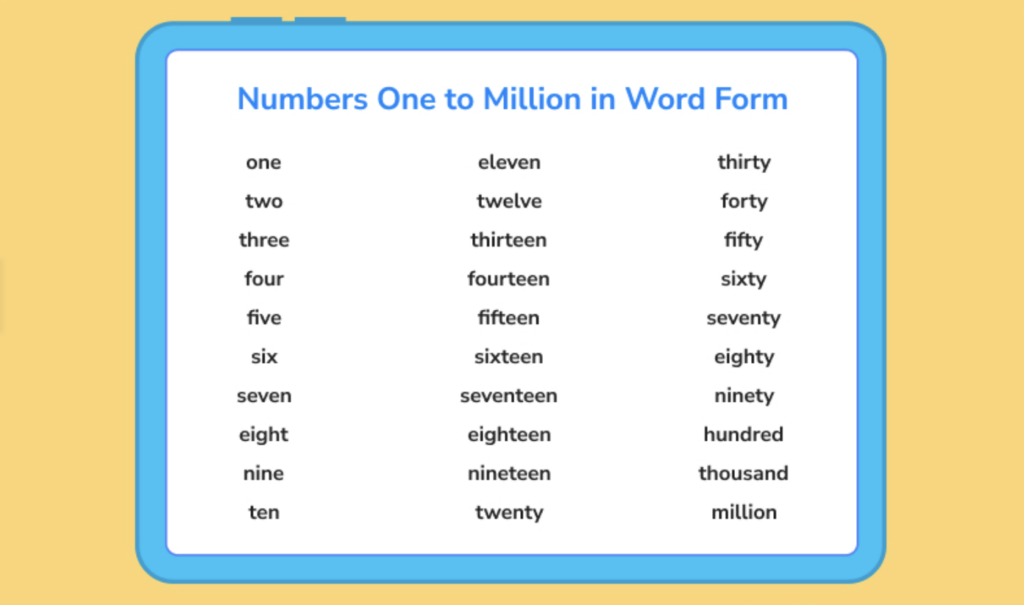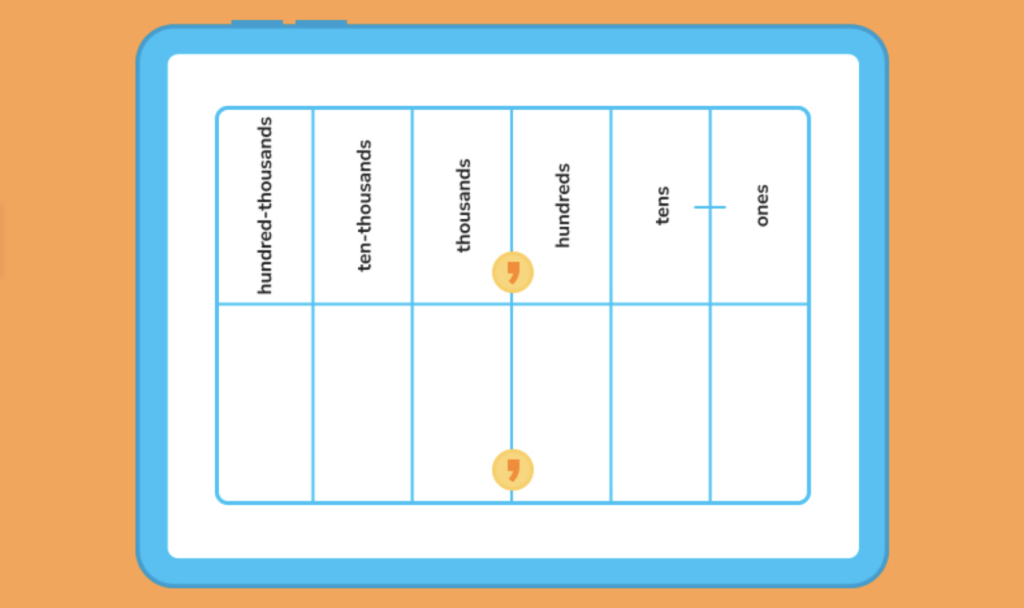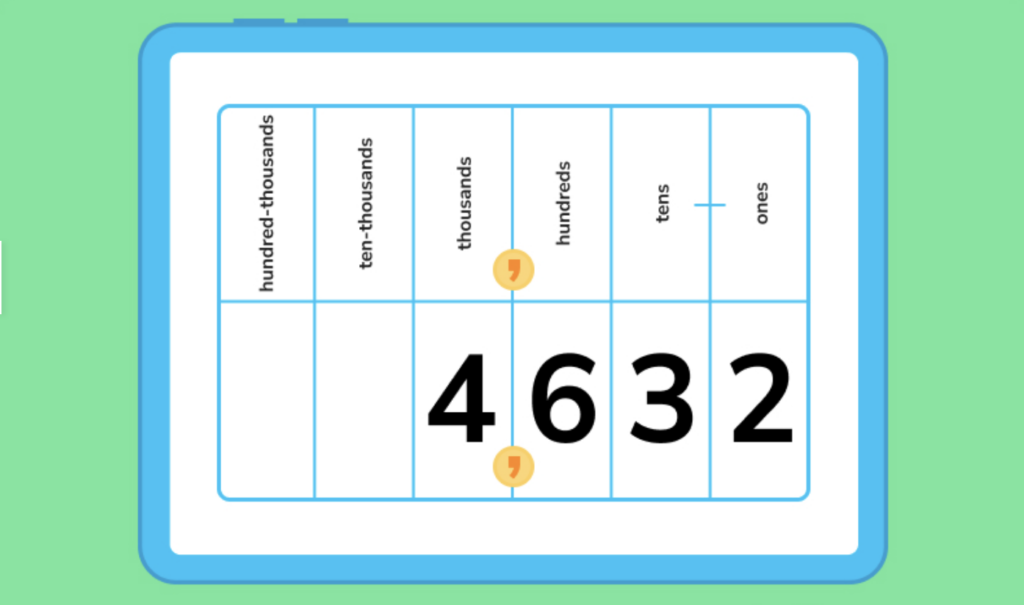

When we write numbers as words, we call it word form! Learn when to use word form and tips for writing numbers.

Author
Amber Watkins
Published
August 30, 2023


When we write numbers as words, we call it word form! Learn when to use word form and tips for writing numbers.

Author
Amber Watkins
Published
August 30, 2023



Author
Amber Watkins
Published
August 30, 2023


Key takeaways
Table of contents
‘One fish, two fish. Red fish, blue fish…’. Do you know which children’s author wrote those famous words? You guessed it, Dr. Seuss!
Dr. Seuss uses the numbers one and two in word form. Like that famous author, when we write we use a lot of numbers! When writing large numbers we usually write them out using digits 0-9. Sometimes though, we write numbers using words. This is called word form!
Word form is another way to write our numbers. For example, instead of writing numbers 2, 4, 7, and 9 in digits, we can write them out using the words two, four, seven, and nine.
Although writing numbers changes how they look, the numbers keep the same meaning. We write numbers in word form in textbooks, on checks, in essays if they are less than 10, and almost everywhere that we can see and read numbers!
Many of the first number words we learn are the names of numbers. These names can be learned through memorisation. Take a look at the most common number names below.

When writing numbers 1-12 you use the name of the number as the word. Here is a list of the numbers 1-12 in word form: One, Two, Three, Four, Five, Six, Seven, Eight, Nine, Ten, Eleven, Twelve
Here’s a trick: numbers 13-19 all end in ‘teen’, so they would be Thirteen, Fourteen, Fifteen, Sixteen, Seventeen, Eighteen, Nineteen
When writing numbers when counting by 10’s the numbers have the word ending “ty”. They would be Twenty, Thirty, Forty, Fifty, Sixty, Seventy, Eighty, Ninety.
Eventually, you will be able to use basic numbers written as words to write larger numbers in word form. Let’s discuss how this is done.
Unlock unlimited maths questions
Put your learning into practice with fun exercises + games that are proven to boost ability!
Get 1 FREE month of Doodle!
Use code MONTH_2026 to enjoy unlimited questions and games
Get 2 FREE weeks of Doodle!
Use code 2WKS_2026 to enjoy unlimited questions and games
Try DoodleMaths for free!
Select a year group
Writing numbers in word form is simple: if you can read it, you can write it. So practice reading numbers!
What will help you read numbers better? Using a place value chart and knowing place values. Let’s see how this is done!


1. First, write the number on a place value chart and read the number out loud.
2. Second, write out what you say.
When reading that number out loud you would say, “Four thousand six hundred and thirty-two”, so that’s what you write. How did we include punctuation?
1. Whenever there is a comma in a number, you add that place value word to the word form. In this example, we added the word thousand.
2. We connect a number in the tens column to a number in the ones place (except 0) by adding a hyphen. In this example, we added the hyphen to thirty-two.
Meet DoodleMaths, the award-winning maths app that’s proven to double a child’s rate of progression with just 10 minutes of use a day!*
Filled with fun, interactive questions covering the whole curriculum, it creates each child a unique work programme tailored to their needs, boosting their confidence and skills in the subject. Try it for free today!

*Based on earning 24 stars a day in DoodleMaths. Read full study

Writing numbers in word form is very important. Let’s talk about when we should use it:
1. Word form should be used when writing small numbers.
Numbers 1-9 should always be written in word form. For example, ‘Every beehive only has one queen bee’. Here the number one is written in word form because it is less than 10.
2. Word form should also be used when beginning a sentence with a number.
If a sentence begins with a number, large or small, it should be written in word form.
For example, ‘Thirty-three thousand kinds of fish have been discovered in the ocean’. Because this sentence began with the number thirty-three thousand, it’s best to write it in word form.
3. Word form should always be used when writing a check
Have you ever wondered why we usually see numbers written as digits and in word form on a check? It is a way to make sure the correct amount of money is taken out of the bank. That is VERY important!
Now it’s time to put what we learned into practice.
ANSWER: Three hundred forty-two
ANSWER: Fifty-two
ANSWER: Six hundred and ninety-five
Yes, all numbers less than 10 should be spelled out in writing. Refer back to the list of numbers 1-12 in word form to see how that’s done.
First, write the amount of money in standard form using digits. Second, write the price in word form underneath. If you need help, place the number in a place value chart, say it out loud, then write it out. Don’t forget your punctuation!


Parents, sign up for a DoodleMaths subscription and see your child become a maths wizard!

Lesson credits

Amber Watkins
Amber is an education specialist with a degree in Early Childhood Education. She has over 12 years of experience teaching and tutoring primary through college level maths. "Knowing that my work in maths education makes such an impact leaves me with an indescribable feeling of pride and joy!"

Amber Watkins
Amber is an education specialist with a degree in Early Childhood Education. She has over 12 years of experience teaching and tutoring primary through college level maths. "Knowing that my work in maths education makes such an impact leaves me with an indescribable feeling of pride and joy!"
Rational vs irrational numbers
Explore the differences between rational and irrational numbers
What is standard form?
Discover how standard form helps us represent numbers and equations clearly
Book a chat with our team
If you’d like to use Doodle’s browser version, please visit this page on a desktop.
To log in to Doodle on this device, you can do so through our apps. You can find out how to download them here: